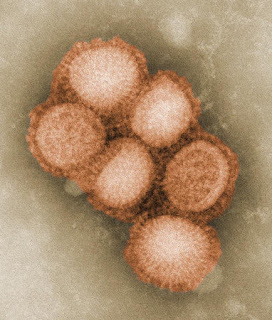Virology by Milly Murphy, Form V

Virology is the study of viruses; their structure, classification and evoloution, their ways to infect and exploit cells for virus reproduction, the diseases they cause, the techniques to isolate and culture them and their use in research and therapy.
The study of viruses has been in the news recently as scientists are trying to develop a vaccine for influenza A H1N1 (swine flu). A strain of this virus killed about fifty million people during the 'Spanish Flu' pandemic in 1918. Information about this virus has been pieced together using perserved tissue samples of the flu's victims. Such research has proved successful in the past, for example when Baruch Blumberg discovered the hepatitus B virus and subsequently developed a vaccine against it. The existence of viruses that infect bacteria was first recognized by Frederick Twort in 1911 which led to an explosion in virology research, since bacteria could be grown in culture easily. In the future, the study of viruses could lead to a cure for many (currently) incurable and fatal diseases.
The study of viruses has been in the news recently as scientists are trying to develop a vaccine for influenza A H1N1 (swine flu). A strain of this virus killed about fifty million people during the 'Spanish Flu' pandemic in 1918. Information about this virus has been pieced together using perserved tissue samples of the flu's victims. Such research has proved successful in the past, for example when Baruch Blumberg discovered the hepatitus B virus and subsequently developed a vaccine against it. The existence of viruses that infect bacteria was first recognized by Frederick Twort in 1911 which led to an explosion in virology research, since bacteria could be grown in culture easily. In the future, the study of viruses could lead to a cure for many (currently) incurable and fatal diseases.

Comments